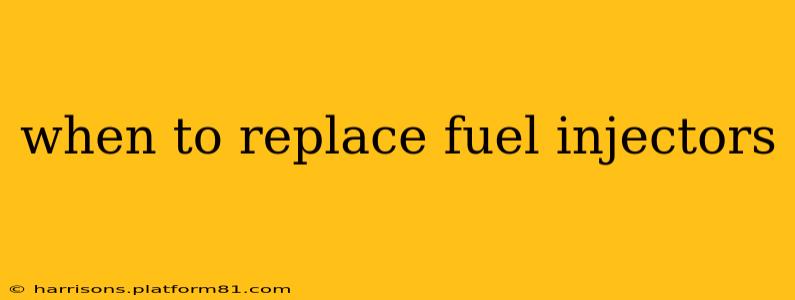Fuel injectors are vital components of your vehicle's engine, responsible for precisely spraying fuel into the combustion chamber. Over time, these injectors can wear out or malfunction, leading to decreased performance and potential engine damage. Knowing when to replace them is crucial for maintaining your vehicle's health and longevity. This guide will delve into the signs indicating it's time for a fuel injector replacement, addressing common questions car owners have.
What are the Signs I Need New Fuel Injectors?
Several symptoms point towards failing fuel injectors. Ignoring these signs can lead to more extensive and costly repairs down the line. Key indicators include:
- Rough idling: A shaky or uneven idle is a common symptom. This suggests inconsistent fuel delivery, a hallmark of failing injectors.
- Poor fuel economy: Noticeably lower gas mileage than usual indicates that your engine isn't burning fuel efficiently, a potential consequence of clogged or malfunctioning injectors.
- Lack of power or acceleration: Difficulty accelerating or a general lack of power can stem from insufficient fuel delivery. This makes it harder for your engine to reach its full potential.
- Misfires: Engine misfires, often accompanied by a rough running engine, are a clear sign that one or more injectors aren't delivering fuel correctly. This can also trigger your check engine light.
- Black smoke from the exhaust: Excessive black smoke can signal rich fuel mixture, suggesting that your injectors are delivering too much fuel.
- Check engine light: While this light can illuminate for numerous reasons, a consistently illuminated check engine light, especially if accompanied by other symptoms, warrants an inspection of your fuel injectors.
How Long Do Fuel Injectors Typically Last?
Fuel injectors typically last for a considerable amount of time, often 100,000 to 150,000 miles, but this lifespan can vary based on several factors. The quality of fuel used, driving habits, and vehicle maintenance all play a role. Using low-quality fuel or consistently driving aggressively can shorten their lifespan significantly. Regular maintenance, including fuel system cleaning, can extend their life.
How Much Does It Cost to Replace Fuel Injectors?
The cost of replacing fuel injectors varies depending on several factors, including:
- The number of injectors needing replacement: Replacing all injectors is generally more expensive than replacing just one.
- Vehicle make and model: Different vehicles have different injector designs and costs.
- Labor costs: Labor charges vary based on location and mechanic's expertise.
- Injector type: The type of injector (e.g., standard, high-performance) will impact the price.
Expect to pay anywhere from a few hundred dollars for a single injector replacement to several thousand dollars for a complete injector system overhaul. It’s always best to get a quote from a trusted mechanic.
Can I Clean Fuel Injectors Instead of Replacing Them?
Yes, in some cases, cleaning your fuel injectors can be a viable alternative to complete replacement, especially if the problem is caused by accumulated deposits. Fuel injector cleaners, available as additives or professional cleaning services, can dissolve these deposits and restore the injectors' performance. However, if the injectors are physically damaged or worn out, cleaning won't be sufficient, and replacement will be necessary.
How Can I Prevent Fuel Injector Problems?
Proactive maintenance is key to extending the lifespan of your fuel injectors. Consider these preventative measures:
- Use high-quality fuel: Using cleaner, higher-octane fuel can significantly reduce deposit buildup.
- Regular maintenance: Schedule regular tune-ups and inspections to catch potential problems early.
- Avoid aggressive driving: Avoid harsh acceleration and braking, which can put stress on the fuel system.
- Address any fuel system leaks promptly: Leaking fuel can lead to injector damage.
By addressing these preventative measures and being aware of the warning signs, you can significantly extend the life of your fuel injectors and avoid costly repairs in the future. If you suspect a problem with your fuel injectors, consult a qualified mechanic for diagnosis and repair.
